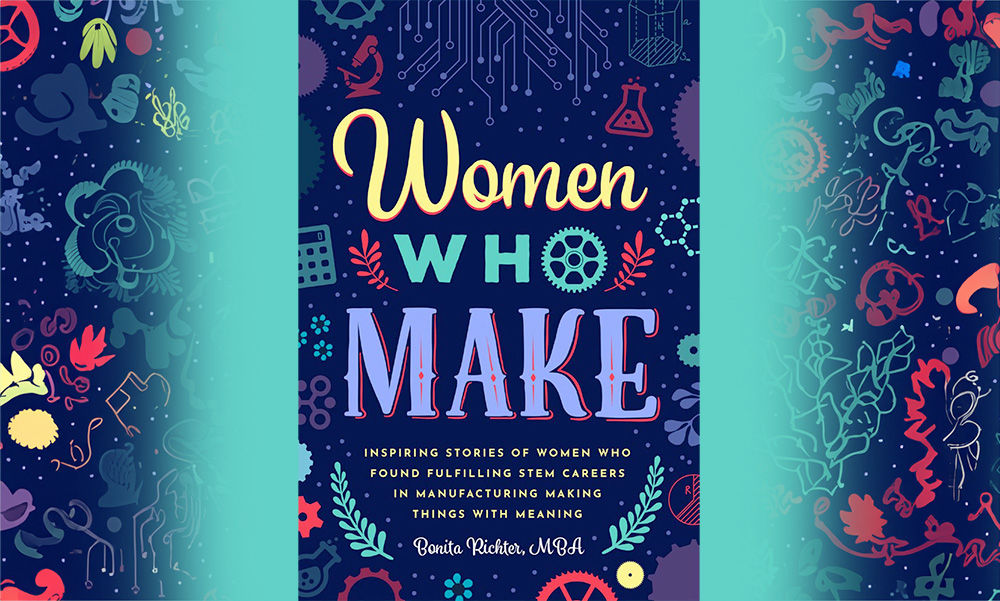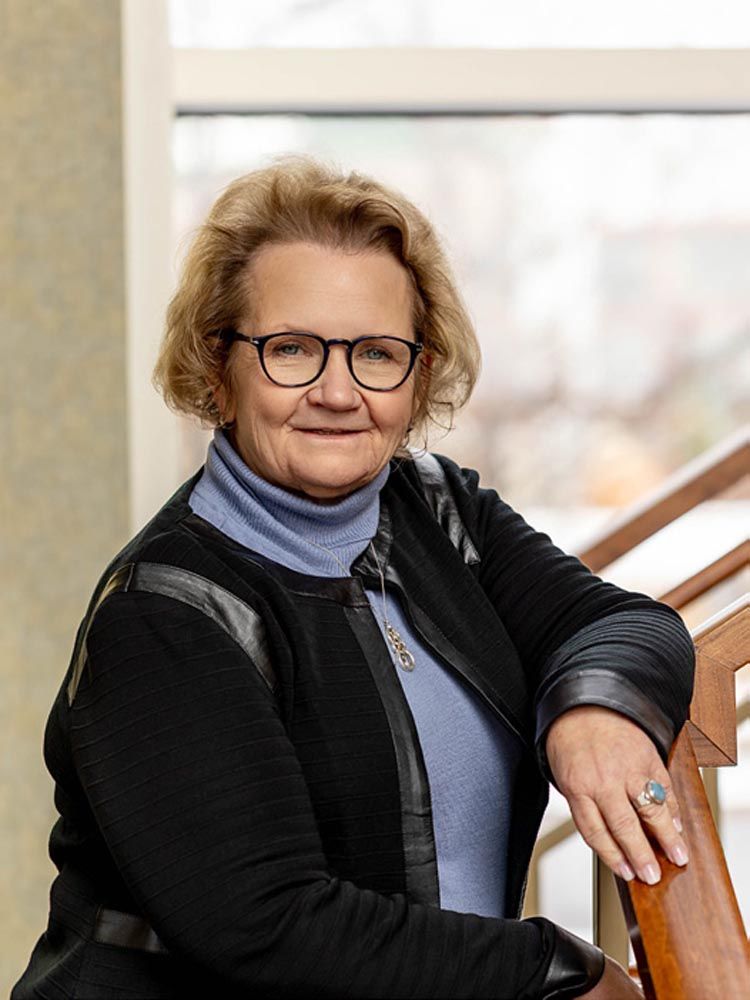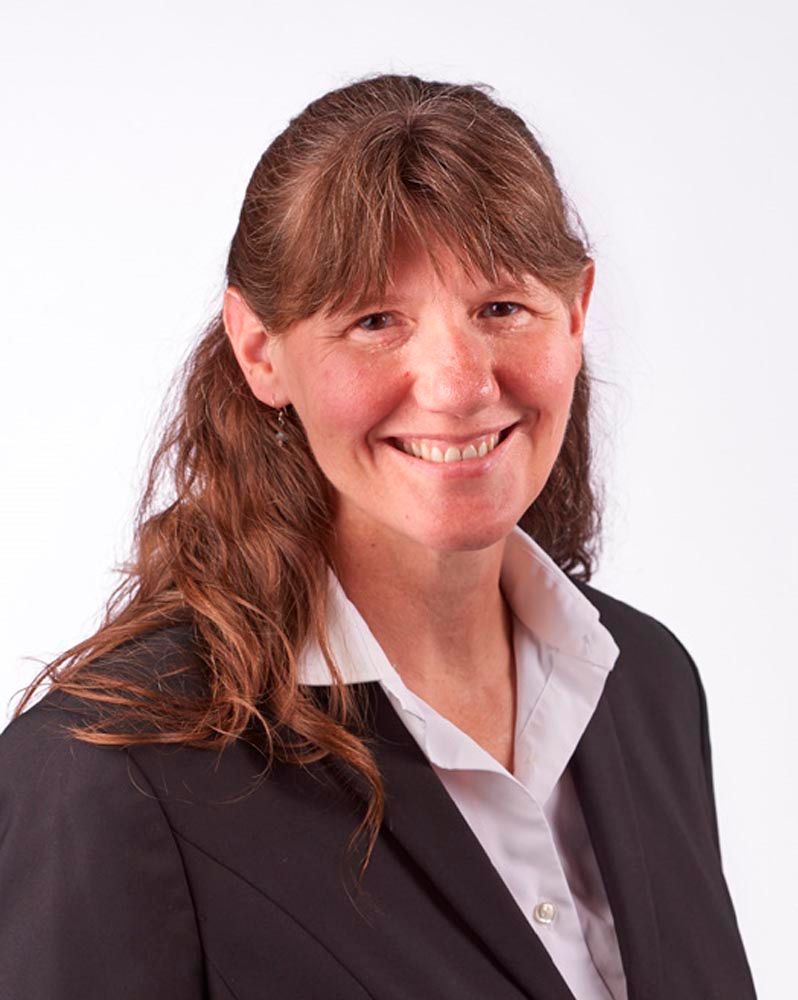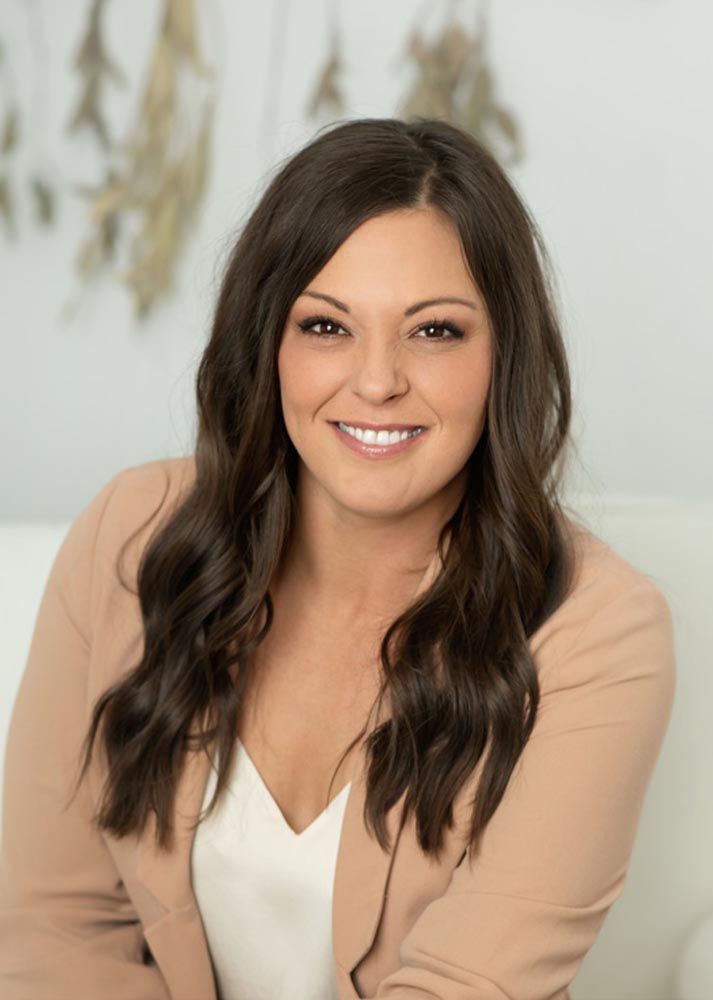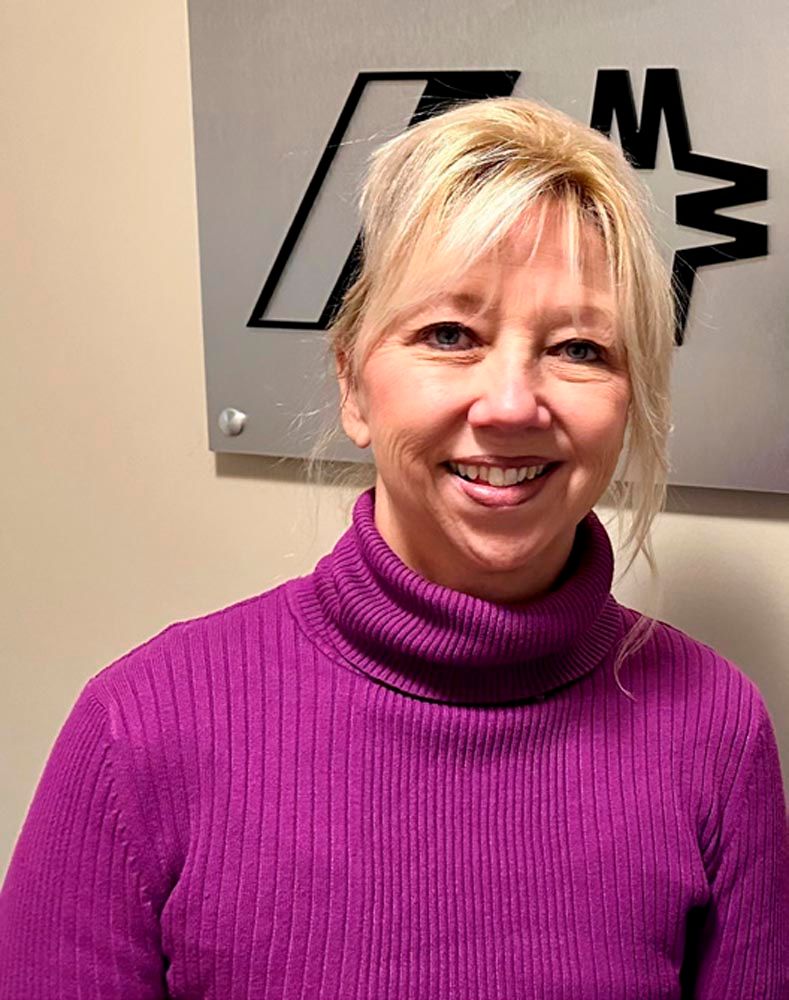
Claudia Hambleton, Office Manager and Corporate Treasurer, German Machine Tools of America (GMTA)
What motivated you to pursue a career in STEM and/or manufacturing?
Ruthie Johnston: I found it to be amazing. I started on a journey of discovery. I was in a brand-new role, learning about something that was also brand-new to me. I feel I am still on that journey today.
Robin Olson: My parents had technical hobbies when I was growing up such as amateur radio, computing, and sailing. They took classes and joined groups where they could learn more. Because they did all this together, my sisters and I also attended many meetings and activities with them. That created an environment where it was normal to learn, build, and communicate technical topics and where it did not matter if you were male or female. When I was eleven, they encouraged me to get my amateur radio license. That helped me to realize that I was capable of understanding and enjoying technical topics.
Michelle Maddox: Being involved with a family business has its own challenges, but one of the biggest motivating factors to stay involved is that we can define our own success. In a family full of entrepreneurs, you learn that your own level of commitment is the determining factor in your overall success. Having the opportunity to continue in a business that was created to provide for our family was an easy choice to pursue.
Career Journey
Could you describe some key milestones in your career within the gear industry?
Ruthie Johnston: The first thing I did was accept that I was a beginner. The next step was to seek out those who were willing to teach me. I needed to learn about gear manufacturing and learn about business. I was very fortunate that I have some very knowledgeable mentors and coaches who have been willing to believe in me and invest in me.
Robin Olson: I was hired at the Falk Corporation as a Gear Software Engineer and joined the AGMA Software Committee in the same year. That started my involvement in the gear industry. I was later promoted to supervisor of gear software, CAD systems, and engineering records. In 2009, I was promoted to manager and my role was expanded to take on product cost-outs and improvements, warranty, test lab, and technical services. That transition took a lot of work and there were many stressful days at first! I was offered my current role in Applications Engineering in 2016. It has been a refreshing change to work with customers to modify our gear drives to fit their application needs.
Michelle Maddox: Each step I have taken at B&R has been a journey much like the manufacturing process. As most would expect (from the stereotypes of being a woman in manufacturing), I began my journey in the office. I have held roles within all units of the organization, including accounting, human resources, purchasing, and my personal favorite: sales. Each new role has been a milestone throughout my career giving me the foundational knowledge of how our business operates inside and out.
What challenges have you faced as a woman in a traditionally male-dominated field, and how did you overcome them?
Ruthie Johnston: I was lucky there were a few well-respected women in this field before me, like Wendy Young. We were anomalies in this industry, but the gear industry is different. Everyone I have exposed to it comments on how close we all are. And that it is like no other they have ever been part of.
Women executives in general have problems being recognized. I think we often get underestimated and treated differently. Women still have hurdles, but it is the awareness that will change it. I really don’t think most of the men I deal with intentionally try to discount women. They need to learn new ways of doing things. Women need to be in conversation with them and not demand but explain how they want to be treated.
Robin Olson: The biggest challenge I faced was when my husband and I wanted to have children. We both wanted to continue working, but we also wanted to be active parents. My husband worked for Baxter Healthcare, which had a mature work-from-home policy and somewhat flexible workdays. I was able to take that model to my boss, who was open to providing some flexibility to me as well. As our children grew up, Dave and I were able to work together so that one or both of us could be involved in their activities, be home when they were sick, or work with their schools on any academic or disciplinary issues.
Michelle Maddox: My experience is somewhat twofold. Being a woman in manufacturing and being in a family-owned business hasn’t exactly been an easy task. As elementary as it may sound, my biggest personal challenge has been wanting people to believe in me. Believe in my dedication, my vision, or even my knowledge in this field. Whether it be from internal or external sources, people at times have the notion that women are “pencil-pushers” or just “secretaries”—that we don’t know what a gear might be or how it even gets made. (Even writing those terms makes me queasy). It is degrading, unfortunate, and creates self-doubt. I have found the only way I overcome this is to keep my head down and keep working, do my best to lead by example, and most of all believe in myself regardless of the stereotypes.
Inspiration and Role Models
Who or what inspired you to enter the gear industry, and were there any women who served as role models for you?
Ruthie Johnston: My inspirations here are not specific to the gear industry. My inspiration here is the two women I probably knew the best or at least the longest in my life. The first is my mom. My father died when I was four. She went on to raise four kids alone. She was not the typical mom of the 50s, 60s, etc. My mom wore jeans and a sweatshirt. She played semi-pro softball; she was an athlete. She served in WWII. From her, I learned to be a survivor and it was ok to be different. She always told me as a mother to treat my daughter the same as my sons. And she always said take time to teach. She loved learning new things. She watched PBS. She dug in and worked hard. The other woman was my mother-in-law. She was a wonderful caring lady. She knew how to make people feel like they were the most important person in the room. She was always dressed and had social graces. She started Marine Associates (the parent company of Croix Gear) and worked alongside her husband until they both retired. I feel I got the best of both worlds.
Robin Olson: When I started, there was a female engineer at Falk who had been there since the late 1960s. She was the person who trained and mentored me in the first three years of my career. She was very competent in her knowledge and abilities, but humble and gracious when working with the other engineers. The other engineers respected her.
Michelle Maddox: Without question, my mother and grandmother were my biggest role models in this organization. In my opinion, they were the backbone of this company. The behind-the-scenes daily heroes if you will. Both women faced their own challenges in their own time but never backed down from any of them. Women who didn’t hesitate to lead quietly when needed. Women who didn’t hesitate to be assertive when necessary—especially in a time when women shouldn’t be. They taught me no matter my age or gender, the only limitation in life is me. Do more, think bigger, and lead by example! I had the very best examples set for me (but I might be slightly biased).
How important do you think it is for young women to have role models in STEM and/or manufacturing fields?
Ruthie Johnston: So important! I hate to say this, but men and women do see things differently at times. We do Manufacturing Day Tours and have the schools come through. Every time our production techs tell us the best questions are coming from the young women on the tour. Those different views expand thinking. That collaboration improves outcomes. Women entering these areas will continue to raise women throughout all avenues of life. Wages, respect, the list is long.
Robin Olson: It is hard for anyone to enter a career in which they cannot picture themselves. With STEM fields still being mostly men, there are also situations that young women may not know how to navigate—such as advocating for themselves or speaking up when they have a different opinion than the majority. Role models provide an image and an example of how to be a productive contributor.
Michelle Maddox: Having role models is extremely important for all genders—especially young women interested in any STEM-based field. Finding a person who motivates you, someone who is relatable, someone you can learn from—this is critical to motivating and encouraging young women to be involved.
Encouraging Young Women
In your experience, what barriers do you think young women face when considering careers in STEM and manufacturing?
Ruthie Johnston: I was just in a conversation about women executives and the views of millennials on the male/female views. These people who came from different industries are not seeing improvement from that age group in how women are viewed. That truly begs the question of what we are doing or not doing to change this. My generation fought for these rights. We still haven’t passed the ERA. Will it take a social/political shift?
Robin Olson: To succeed in STEM and manufacturing, students need to have an interest in math and technology as well as an understanding of how things are made. Young women do not necessarily grow up with exposure to these things. As a result, they are not confident in STEM and do not choose it as a career.
For those who get engineering degrees and find jobs in STEM and manufacturing, it can be difficult to have children and raise families without flexibility for parental leave, sick children, after-school care, etc. This is particularly tough when other engineers do not need the same considerations because the work culture may not include the ability to request flexibility.
Michelle Maddox: The overall gender bias that women simply do not engage in these types of careers is one of the largest barriers women face. We have come a long way since the old notion that women belong at home, but still have a very long way to go. Even potential discrimination—whether gender-based, pay equality, or even harassment—can deter young women from participating in these fields. An overall lack of support from parents, teachers, or even peers can also be a deterrent.
How can the gear industry specifically attract and retain more women professionals?
Ruthie Johnston: This is one I stumble on. The young women who are coming through as leaders now are fabulous! I would really like to see an actual forum maybe via Zoom/Teams quarterly that continues to support this group so they can support each other and possibly be in conversation to address issues they see. They are living it. What better source is there?
Robin Olson: We need to get women interested in mechanical engineering and gearing when they are still in middle and high school. The gear industry can focus on training and mentoring to allow students and engineers the chance to build their knowledge and confidence in our field. This can include attending school career talks, volunteering in STEM activities in schools, or facilitating training and mentoring programs in our companies.
Having a workplace that understands the needs of employees to take care of their families will also retain women—and men as more couples are sharing the workload of raising children. The ability to work virtually makes it possible to make up time on projects by working later at night from home.
Michelle Maddox: I recently had the opportunity to attend a networking event for Women in Manufacturing and Engineering at the MPT Expo. It was an event to highlight women at various stages in their careers discussing the adversities and challenges of their respective journeys. Hearing from a panel of my peers was not only insightful but also inspiring.
Women in this specific industry are continually stepping up to lead by example, mentor, and provide insight into this industry. We must continue to do so to encourage the next generation of women!
Educational Outreach
Have you been involved in any initiatives to promote STEM and/or manufacturing education and careers among young women?
Robin Olson: I mentor a FIRST Robotics Competition team at our local high school as a robot design mentor. Our team is a little over 30 percent female students. I am so proud of the team’s STEMinists! They occupy technical roles in the robot construction and programming efforts where they contribute alongside the young men. We also have young ladies in lead roles in our business team. It is exciting to see these kids graduate from high school and move on to challenges and success as adults.
What strategies do you think are effective in encouraging girls to pursue STEM and/or manufacturing subjects from an early age?
Ruthie Johnston: Locally with the high schools and International Women’s Day Events.
Robin Olson: I find that when you teach a girl to do something firsthand, such as use a drill or work a calculation, she stops being intimidated by it. After that, the barriers to trying something new become shorter because she is building her experience and her confidence. I am sure this is true of young men, too, but the first hurdle for girls seems to be higher. We need to put tools and projects into girls’ hands so that they can get experience and learn to succeed with them.
Michelle Maddox: Early education is key! It is critical that our education system implements STEM/STEAM-based courses from an early age, preferably from an elementary level. It is vital that those within those roles encourage and inspire young women to pursue STEM-based careers.
I am very lucky to have a best friend who also happens to be a middle school teacher. (Hats off to her!) She is a young woman actively engaged in extracurricular activities that are largely STEM-based. She sponsors two different programs both of which create innovation, collaboration, and creative thinking - all the while promoting STEM as something fun and exciting! Programs like this are vital for the next generation of manufacturing leaders. She herself is a role model, especially to the young women who might not have become involved if not for her encouragement.
It is critical to have an early education in the world of STEM subjects and it is a particular bonus if you have a teacher who actively promotes the opportunities in these fields.
Claudia Hambleton: You don’t know what you don’t know. It’s important for younger people to just try new things and take risks. I always tell my kids: do the things you’re a little bit scared to do because those are the things that pay off. And a college education isn’t necessarily for everybody. I think we need more apprenticeship programs and different sorts of mentorship programs along the lines of what some of these companies are doing. Sort of the German apprenticeship model, I think works well for a lot of people. And to see more women coming into those roles would be great. Different ways of thinking and having different mindsets and different perspectives are a huge resource a lot of companies are missing. Especially with the skills gap now, how are we going to fill all these positions when you exclude a whole group of potential workers? We must think differently.
Skills and Education
Are there specific educational programs or initiatives you would recommend for aspiring female engineers and manufacturing professionals?
Robin Olson: I highly recommend that girls in elementary, middle, and high school become involved in the FIRST Robotics programs. These programs require students to design, build, program, test, and compete with a robot created to carry out a series of tasks. Students learn to research solutions, build components, and troubleshoot the results. The teams are sponsored and mentored by businesses, which gives students the chance to learn current business practices and tools as well.
Michelle Maddox: Education, education, and education! The AGMA has multiple educational opportunities available for members and nonmembers alike. These courses are gear-specific and provide a solid knowledge base for all levels of learning. In addition to the AGMA, there are several member companies that offer “gear schools” to further enhance your education. It is impossible to remain assertive and confident if you lack knowledge in your respective fields. Education is key!
Personal Achievements
Can you share a particularly rewarding or proud moment in your career within the gear industry?
Ruthie Johnston: Elected to the Board of Directors of AGMA, President of the Foundation.
Robin Olson: I have the honor of being the US delegate to the ISO working group on gears, which covers mechanical and thermal rating practices for spur and helical gearing. Being elected to that position by AGMA was a proud moment because it meant that my colleagues in the US gear industry felt I was capable of the responsibility.
Michelle Maddox: B&R has been a member of the AGMA since 1982. We have been involved in the association at various levels, but mostly quiet participants throughout our membership. I wanted to increase our involvement and in 2021 I joined the SNL committee (formerly SRN). By 2022, I had been nominated and elected by my peers to serve on the Board of Directors for the AGMA. This is particularly rewarding in many ways professionally and on a personal level, I can’t help but think that the founders of B&R would be proud.
How do you hope your experiences can inspire other women to pursue similar paths?
Robin Olson: I hope that they see that it is possible to be a woman and have a career in engineering with contributions to your company and industry without sacrificing your family.
Industry Trends and Future Outlook
How do you see the role of women evolving in the gear industry in the coming years?
Ruthie Johnston: I see more women encouraged and excited to step out and do more. More choices. I have more women working on the Team at CG. They are in many roles. “Traditional” lines for roles are blurring and that is great.
Robin Olson: There is a big effort to make STEM education and experiences available to more students in grade school, middle school, and high school. This is going to bring more young women into mechanical engineering and gearing. They will bring a unique perspective to the industry as contributors and as they are promoted to leaders.
Advice for Aspiring Women in STEM
What advice would you give to young women who are considering a career in the gear industry or STEM fields?
Ruthie Johnston: Go for it! You may find purpose and something you love as I did. You can always reinvent; I was 57 years old.
Robin Olson: Find a mentor (female or male) who can guide you through the culture and situations that you will encounter. Be curious and ask questions so that you can learn quickly. Most importantly, find your seat at the table in meetings and productively participate in the discussions.
Michelle Maddox: Be vigilant, dedicated, and unwavering. Don’t be ashamed to be assertive—it means you believe in what you are saying—you will never get people to believe in you if you don’t believe in yourself! Lastly, I learned a quote many years ago and I do my best to live by this each day: “To be humble in success, and without bitterness in defeat.”
Claudia Hambleton: Do those things you’re uncomfortable doing. They will become less and less uncomfortable, and you’ll become an expert, or you will become quite comfortable dealing with uncertainty. And that’s a real skill. And I don’t think most people are born that way. Nobody is. It takes practice, and you must put yourself out there and try it.
So that will help change the narrative, too, for women. We must give more opportunities to women and get them to just try new things, and that’s hard. But I think that would be my biggest advice is, yeah, do the things that make you a little uncomfortable and try those new things because they pay off. I guess that would be my biggest advice piece.
How can they navigate potential challenges and thrive in a male-dominated industry?
Ruthie Johnston: With my executive coach I developed my leadership declaration. It is my rock and my foundation that I stand on especially when I am being pulled away from it or struggling through tough things. Find a small group that will always care about what you care about and be honest enough to challenge you to be your best. That may be only one or two people.
Robin Olson: They must have a voice and advocate for themselves. This means asking for flexibility when it’s needed but being considerate of business goals and objectives. It means speaking up tactfully when stereotypes or biases are creating a challenging environment. It means applying for new responsibilities when they want the next challenge. Mentors are wonderful guides for this!




